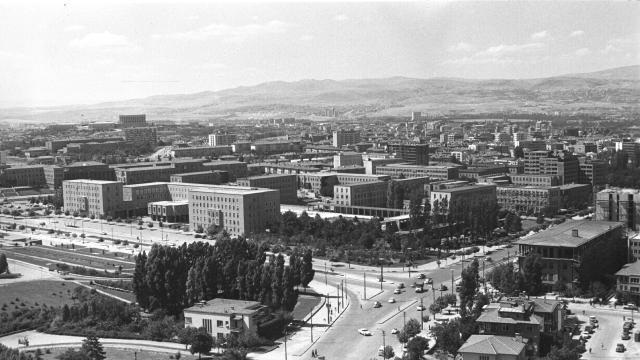
Ankara, the center of the National Struggle, became the capital of the young Turkish Republic on October 13, 1923 after the liberation of Anatolia from enemy occupation.
When the country was occupied at the end of the First World War, Mustafa Kemal Pasha set foot in Samsun on May 19, 1919 and launched the National Struggle.
The Ottoman Parliament convened for the last time in Istanbul on January 12, 1919, but on March 16, 1919, the British entered Istanbul and put an end to the work of the Parliament. There was no longer any possibility for the Ottoman Parliament to convene in Istanbul. A capital city was needed where the deputies would convene and the country would be governed.
On March 19, 1919, Mustafa Kemal Pasha sent a circular to some provinces and commands with the statement “The Turkish nation will protect its own life and independence”. After this circular, representatives and members of the Ottoman Mebusan Assembly began to gather in Ankara.

Ankara’s importance in the War of Independence stemmed from the fact that it was connected by rail to enemy-occupied locations such as Geyve Gorge, Kütahya and Afyon, and had adequate combat capabilities.
Mustafa Kemal Pasha arrived in Ankara on December 27, 1919 with members of the Council of Representatives. Mustafa Kemal Pasha, who was welcomed with great love and enthusiasm by the people and Seğmen in Ankara, prepared the plans for the War of Independence in this city.
The decision to establish regular armies for the success of the war was taken in Ankara. These armies defeated the enemy in İnönü, Sakarya and Dumlupınar. On August 30, 1922, the War of Independence was completed with the Battle of the Commander-in-Chief.
“The Seat Of The Turkish State Is The City Of Ankara”
On October 9, 1923, İsmet Pasha, Minister of Foreign Affairs, presented a single-article draft law to the Parliament with the phrase “The administrative center of the Turkish state is the city of Ankara”.
On October 10, İkdam reported that “in the meeting that lasted from 2 to 6 p.m., in accordance with the circular given by İsmet Pasha and his colleagues, it was accepted to add the article ‘The city of Ankara is the seat of the Turkish state’ to the Law on the Organization of the Principles and that the issue would be brought to the agenda again in the general meeting of the Assembly the next day and the legality of the article would be defended.”

In the Tanin newspaper of the same date, a news article titled “Ankara Central Government” reported that the proposal to name Ankara after Gazi Mustafa Kemal Pasha was not even put on the agenda by Mustafa Kemal Pasha, who chaired the meeting.
The draft law was quickly passed by the Layiha Commission on October 10 and the Constitutional Commission on the same day, and on October 13, 1923, it came to the General Assembly of the Parliament.
After discussions, the bill was adopted by a majority of votes. When some members of the parliament objected to Speaker Ali Fuat Pasha’s “unanimous vote” by shouting “unanimously”, Ali Fuat Pasha said, “Sir, there are some hands that did not rise. I cannot say unanimously, I saw it, it was accepted by a large majority” and ended the session.

This issue, which was brought to the agenda in the form of a legislative proposal, turned into a decision as “The report dated 10.10.1923 prepared by the Constitutional Commission on the legislative proposal numbered 2/188 of Malatya Deputy İsmet Pasha regarding the city of Ankara as the capital of the Turkish state was read at the 2nd session of the 35th meeting of the Grand National Assembly of Turkey dated 13.10.1923 and accepted as is and it was decided by a large majority that the city of Ankara would be the capital of the Turkish state”.
The resolution crowned Ankara’s status as the de facto center, which it had maintained since the arrival of Mustafa Kemal and the Delegation of Representatives, with the title of capital.

Since this text was not a law but a resolution of Parliament, it was later incorporated into the Constitution.
“All Thoughts Were Centered On Ankara As The Capital Of The New Turkey”
Mustafa Kemal Atatürk explained the importance of Ankara’s becoming the capital in the Nutuk: “All thoughts were gathering that the capital of the new Turkey should be in Anatolia and the city of Ankara. Geography and strategy were of the utmost importance. It was very necessary to put an end to internal and external indecisions by determining the capital of the state as soon as possible.”
“A Magic Invisible Hand Changed Everything”
After Ankara became the capital, a rapid development activity was initiated. Foreign experts were brought in to plan the city’s future years. Education and cultural institutions were prioritized.
Foreign travelers who visited the city in those years said, “A magic invisible hand changed everything.” “Real public buildings rose where once the dead lay, many hotels opened their doors with improvements that offered the comfort expected from a capital city. Great schools were built. Many neighborhoods were created near Yenişehir, Cebeci, Çankaya, Çankırı Kapı, and the train station.”






